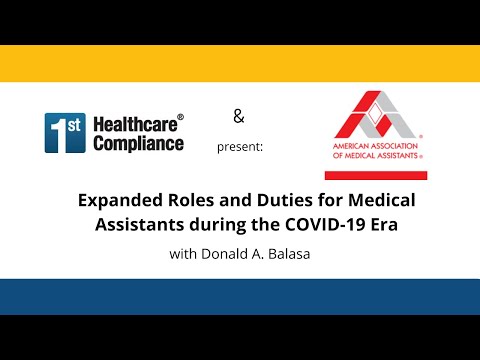Job Description for a Medical Assistant
Contents
A medical assistant job description may vary slightly depending on the employer, but typically includes a combination of clinical and administrative duties.
Checkout this video:
Duties of a medical assistant
A medical assistant is a multi-skilled professional who supports the work of physicians and other health professionals. They perform a variety of administrative and clinical tasks to keep the office running smoothly and help provide quality patient care.
Most Medical assistants work in outpatient settings, such as clinics or doctor’s offices. Some may work in hospitals or other healthcare facilities. Some medical assistants are certified and have completed a formal training program, while others have received on-the-job training.
The duties of a medical assistant vary depending on their specific job duties and the state in which they practice. However, there are some common duties that most medical assistants perform, such as:
• Answering phones and taking messages
• Scheduling appointments
• Checking patients in and out
• Updating patient medical records
•Keeping treatment areas clean and organized
•Assisting with minor office surgeries
•Assisting with patient examinations
•Taking patient vital signs
•Drawing blood
•Preparing lab specimens
Medical assistants perform many important tasks within a healthcare setting. They play a vital role in ensuring that the office runs smoothly and that patients receive quality care.
Education and training requirements
Medical assistants are unlicensed individuals who perform non-clinical duties in medical offices and clinics. They work alongside licensed medical professionals, such as physicians and nurses. Although their job duties vary depending on state law and the specific medical office or clinic they work in, they typically perform administrative tasks, such as answering phones, scheduling appointments, and taking and recording patients’ medical histories. They may also perform clinical tasks, such as taking blood pressure readings, administering electrocardiograms (EKGs), drawing blood, and removing sutures.
Most medical assistants have completed a postsecondary education program that lasts between one and two years. These programs are offered by community colleges, technical schools, vocational schools, and some four-year colleges. Some states have certification requirements for medical assistants; however, certification is not always required.
Skills required
Strong people skills are vital for medical assistants, who frequently interact with patients who may be worried, anxious or in pain. They need to be able to handle these interactions in a compassionate and professional manner.
Medical assistants should also have good organizational skills. They frequently have to keep track of patients’ appointments, medications and test results. This can be a challenge in a busy medical office or hospital.
Some medical assistants specialize in working with insurance companies, filing insurance claims and verifying coverage for treatments and procedures. These “insurance specialists” need to have a good understanding of the often-complex world of health insurance
Salary expectations
How much does a medical assistant make?
This is a difficult question to answer because medical assistants can be paid in a variety of ways. They may be paid hourly, by salary, or by the number of patients they see. In addition, medical assistants may receive benefits such as health insurance and paid vacation days.
Medical assistants in the United States make a median salary of $33,480 per year, or $16.08 per hour. This means that half of all medical assistants earn less than this amount, and half earn more. The lowest 10% of medical assistants earn less than $24,000 per year, while the highest 10% earn more than $48,000 per year.
Job outlook
The job outlook for medical assistants is positive. The Bureau of Labor Statistics projects that the occupation will grow by 29 percent from 2019 to 2029, much faster than the average for all occupations. This growth is being driven by the aging baby-boomer population, which is increasingly needing medical care, and by the increasing number of physician practices that are hiring medical assistants to perform routine administrative and clinical tasks so that physicians can see more patients.
Working hours
Medical assistants typically work full time, although some may work part time. Schedules vary depending on the needs of the employer. Many medical assistants work in physicians’ offices, hospitals, and clinics. Hours may include evenings and weekends, and some medical assistants may be on call.
In addition to administrative duties, medical assistants perform many clinical tasks, such as taking medical histories and recording vital signs. They explain procedures to patients and provide them with pre- and post-operative instructions. Medical assistants also collect and prepare laboratory specimens or perform basic laboratory tests on the premises, dispose of contaminated supplies, and sterilize medical instruments. Some medical assistants specialize in areas such as podiatry or ophthalmology.
Pros and cons of the job
There are pros and cons to every job, and being a medical assistant is no different. On the plus side, medical assistants enjoy a high level of job satisfaction and stability. They also earn a good salary, with the median pay for medical assistants being $16.00 per hour.
However, there are some downsides to the job as well. Medical assistants often have to work long hours, including evenings and weekends. They also deal with sick patients on a daily basis, which can be stressful. If you’re considering a career as a medical assistant, make sure you weigh the pros and cons carefully before making your decision.
What to expect on the job
Working as a medical assistant is a demanding but rewarding career choice. Medical assistants are an important part of the healthcare team, providing support to doctors and other medical staff while ensuring that patients receive the best possible care.
While each medical assistant’s job will be different depending on the employer and the specific duties required, there are some commonalities. Medical assistants typically work in both clinical and administrative roles, and their responsibilities may include taking patient medical histories, scheduling appointments, preparing patients for examination, handling insurance paperwork, and assisting with minor office procedures.
Medical assistants must have strong communication and interpersonal skills, as they will be working with patients, doctors, and other members of the healthcare team on a daily basis. They must also be detail-oriented and organized, as they will often be responsible for managing patient files and keeping track of important medical information. In many cases, medical assistants will also be responsible for handling basic office duties such as answering phones, ordering supplies, and performing light bookkeeping tasks.
Advancement opportunities
As your experience as a medical assistant grows, you may find yourself taking on more responsibility and tasks, such as handling more administrative duties or performing clinical tasks previously performed only by licensed medical personnel. With more experience, you also may eventually move into a supervisory role or find greater opportunities for professional development and earn a higher salary.
Tips for success
Medical assistants are important members of the health care team who provide vital support to doctors and other medical professionals. If you’re thinking of becoming a medical assistant, here are a few tips to help you succeed in this rewarding career.
First, it’s important to have excellent communication skills. Medical assistants need to be able to communicate with patients, doctors, and other members of the health care team. They also need to be able to understand and follow instructions.
Second, medical assistants need to be detail-oriented. They have to be able to keep accurate records and pay attention to details when providing care to patients.
Third, medical assistants need to be good at time management. They often have to juggle several tasks at once and make sure that everything is done on time.
Last, but not least, it’s important to have a positive attitude. Medical assisting can be a demanding job, so it’s important to be able to stay calm under pressure and maintain a positive outlook.







